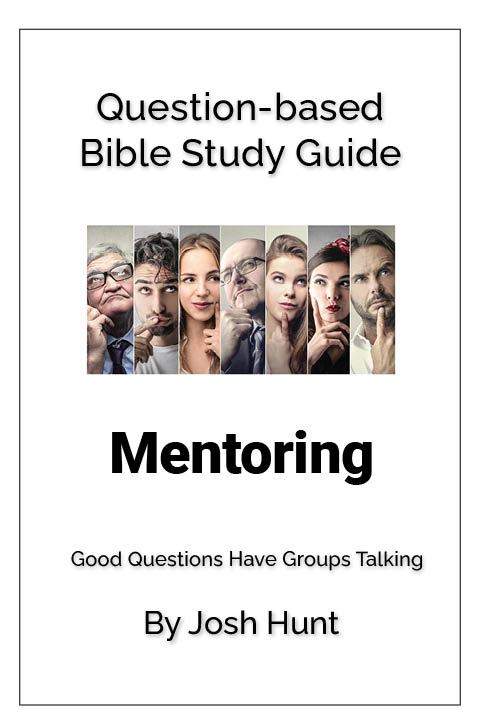Lesson #1 Lesson #2 Lesson #3 Lesson #4 Lesson #5 Lesson #6 Occasionally I come across people who object to the whole concept of mentoring because they can’t find the word “mentor” in the Bible. “You’re just importing the latest fad from the business world,” they argue. “You’re just putting a secular label on the biblical concept of discipleship.” Am I? I’ll grant that the word “mentor” does not appear in Scripture. But I can’t agree that mentoring is a fad of recent origin. As we’ve seen, the original Mentor dates from Homer’s Odyssey, which takes us back more than eight hundred years before Christ. And the role that Mentor carried out—bringing up young Telemachus while his father was away at war—happens to be the pattern by which children have been brought to adulthood in nearly all societies throughout history—except for our own. An Age-Old PatternIn fact, mentoring was the primary means of instruction in Bible times, as Scripture attests. I’ve already mentioned several examples of mentoring relationships: Jethro and Moses, Jonathan and David, Barnabas and Saul, Paul and Timothy (and see Mentoring Relationships in the Bible on the next two pages). We also know that in Jewish homes of that day, particularly in the Old Testament era, children learned most of their skills from their parents, members of the extended family, and neighbors in the community, using a hands-on methodology. As a result, most people followed in their parents’ footsteps. Sons inherited the occupations of their fathers, and daughters took on the responsibilities of their mothers. MENTORING RELATIONSHIPS IN THE BIBLEMentoring was a way of life in Bible times. It was the primary means of handing down skills and wisdom from one generation to the next. So it’s not surprising that Scripture gives us numerous examples of mentoring relationships. The list below shows some of the more prominent. By studying the passages indicated, you can learn a lot about the principles and practice of mentoring. (Also see the diagram Barnabas: A Ministry of Multiplication, p. 141.) In the Old TestamentJethro and Moses (Exodus 18)—Jethro taught his son-in-law the invaluable lesson of delegation. Moses and Joshua (Deuteronomy 31: 1-8; 34:9)—Moses prepared Joshua to lead Israel into Canaan. Moses and Caleb (Numbers 13; 14:6-9; 34: 16-19; Joshua 14:6-15)—It appears that Moses groomed Caleb for leadership, and inspired in him an unswerving faith in the Lord’s promises. Samuel and Saul (1 Samuel 9-15)—Samuel not only tapped Saul to become Israel’s king, but tried to shape his character as well. Even when Saul rebelled against the Lord, Samuel kept challenging him to repent and return to God. Samuel and David (1 Samuel 16; 19: 18-24)—Samuel anointed David as king and gave him refuge from Saul’s murderous plots. Jonathan and David (1 Samuel 18:1-4; 19:1-7; 20:1-42)—An outstanding example of peer mentoring, Jonathan and David remained loyal to each other during the troubled days of Saul’s declining reign. Elijah and Elisha (1 Kings 19:16-21; 2 Kings 2:1-16; 3:11)—The prophet Elijah recruited his successor Elisha and apparently tutored him in the ways of the Lord while Elisha ministered to Elijah’s needs. Jehoiada and Joash (2 Chronicles 24:1-25)—The priest Jehoiada helped Joash-who came to the throne of Judah when he was only seven years old-learn to rule according to godly principles. Unfortunately, Joash turned away from the Lord after his mentor died. In the New TestamentBarnabas and Saul/Paul (Ads 4:36-37; 9:26-30; 11 :22-30)—Barnabas opened the way for Saul to associate with the church after his dramatic Damascus Road conversion. Barnabas and John Mark (Ads 15:36-39; 2 Timothy 4:11)—Barnabas was willing to part company with Paul in order to work with John Mark. Later, Paul came around to Barnabas’s point of view, describing John Mark as “useful to me for ministry.” John Mark is believed to have been the primary author of the gospel of Mark. Priscilla and Aquila and Apollos (Ads 18:1-3, 24-28)—Tentmakers Priscilla and Aquila served as spiritual tutors to Apollos at Ephesus. As a result. Apollos became one of the early church’s most powerful spokesmen for the gospel. Paul and TImothy (Acts 16:1-3; Philippians 2:19-23; 1 and 2 Timothy)—Paul invited Timothy to join him during one of Paul’s missionary journeys. Timothy eventually became pastor of the dynamic church at Ephesus. Paul and Titus (2 Corinthians 7:6, 13-15; 8: 17; Titus)—Paul, along with Barnabas, apparently won this Greek-speaking Gentile to the faith and recruited him as a traveling companion and coworker. Titus became a pastor and, according to tradition, the first bishop of the island of Crete. The Greeks took a slightly different approach. They looked upon the raising of young children as a menial occupation. Therefore, they delegated it to slaves. When a boy became six, he was assigned a pedagogue or tutor, a slave who raised him until puberty. Paul refers to this role in Galatians 3:24–25, where he likens the Law to a harsh disciplinarian, or tutor (pedagogue), as opposed to Christ, who offers grace. Likewise, he told the Corinthians that “even though you have ten thousand guardians (or pedagogues) in Christ, you do not have many fathers, for in Christ Jesus I became your father through the gospel” (1 Corinthians 4:15). In both cases, he was referring to slaves who essentially had the same role as Mentor in Homer’s Odyssey. (For other Bible passages related to the concept of mentoring, see pp. 191–192.) Hendricks, Howard, and William Hendricks. 2009. As Iron Sharpens Iron: Building Character in a Mentoring Relationship. Chicago, IL: Moody Publishers. |
If you are wanting to do a particular passage or book study and can't find it, feel free to email me at josh@joshhunt.com21 Laws of Discipleship -- the book -- |



















